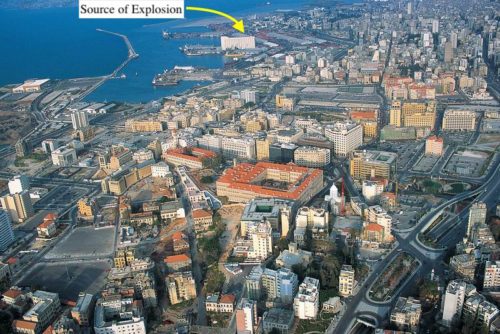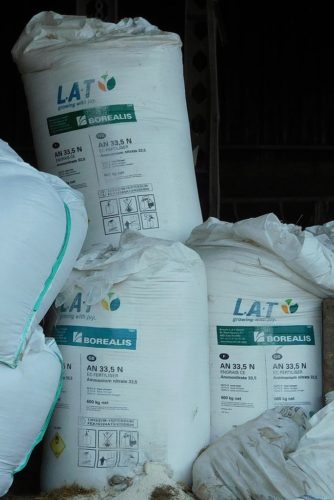Beirut, Lebanon —(Map)
Massive explosions have killed over 135 people and injured thousands in Beirut, the capital of Lebanon. The blasts have caused so much damage that the city is struggling to respond.
What Happened?
Around 6 in the evening on August 4, there was an explosion in the Port of Beirut. That’s the area where ships enter to load or unload items. The area has many large storage buildings, called warehouses. It also stores important food supplies, such as grains for making flour.

(Source: Yoniw [Public domain], via Wikimedia Commons.)
There had been a fire in a warehouse, which seemed to start the first explosion. The explosion sent out a cloud of smoke, and flashes that looked like fireworks.
That was followed by a second, massive explosion, which rocked the city. The second explosion was so strong, the effects were felt over 150 miles (240 kilometers) away.
😕
This image has not been loaded because of your cookie choices. To view the content, you can accept 'Non-necessary' cookies.
The first blast was followed by a second, massive explosion, which rocked the city. The second explosion was so strong, the effects were felt over 150 miles (240 kilometers) away.
What Are the Effects?
The effects were like an earthquake. Roofs fell in, buildings fell down, windows were shattered, and cars were flipped over. Lebanon is a country that has seen years of war. The explosions on Tuesday reminded many people of war time.
The damage is so great that it’s still not clear how many people have been affected. At least 135 people have been killed. Nearly 5,000 people were injured, and around 300,000 have been left without homes.
😕
This image has not been loaded because of your cookie choices. To view the content, you can accept 'Non-necessary' cookies.
The effects were like an earthquake. Roofs fell in, buildings fell down, windows were shattered, and cars were flipped over. The damage is so great that it’s still not clear how many people have been affected.
It has been difficult to get help for the injured people because many of the hospitals are already full of coronavirus patients. It’s also hard for vehicles to drive through the streets because they are filled with objects torn apart by the blasts.
Much of the Port of Beirut has been destroyed, along with the neighborhoods around it. Rebuilding will be difficult, since the port is needed to bring supplies in.
😕
This image has not been loaded because of your cookie choices. To view the content, you can accept 'Non-necessary' cookies.
It has been difficult to get help for the injured people because many of the hospitals are already full of coronavirus patients. It’s also hard for vehicles to drive through the streets because they are filled with objects torn apart by the blasts.
The blast also destroyed the city’s second largest supply of grain. Lebanon has been struggling with a lack of food during the coronavirus crisis. The loss of the grain will make the country’s food shortage even worse.
Many countries from around the world are sending support teams and emergency supplies to try to help out.
😕
This image has not been loaded because of your cookie choices. To view the content, you can accept 'Non-necessary' cookies.
The blast also destroyed the city’s second largest supply of grain (above, still standing, but damaged). Lebanon has been struggling with a lack of food during the coronavirus crisis. The loss of the grain will make the country’s food shortage even worse.
How Did The Explosions Happen?
One of the warehouses at the port held 5,500,000 pounds (2,500,000 kilograms) of a material called ammonium nitrate. The main use of ammonium nitrate is to put on fields to help plants grow. But it can also be used to make explosives, such as bombs.
In 2014, the government took the ammonium nitrate off of a ship that no longer had an owner, and placed it in the warehouse to keep it safe. In fact, little was done to make sure the material was stored safely.

(Source: Cjp24 [CC BY-SA], via Wikimedia Commons.)
It’s not clear who exactly was responsible for keeping the ammonium nitrate safe. The government says that it will investigate carefully.
No matter what the result of the investigation is, it’s not likely to make the government more popular.
😕
This image has not been loaded because of your cookie choices. To view the content, you can accept 'Non-necessary' cookies.
Even before the blasts and the coronavirus, life in Lebanon was very difficult. People have been protesting against the way the government manages things since last year. This protest in Beirut was held on June 6.
Even before the blasts and the coronavirus, life in Lebanon was very difficult. People have been protesting against the way the government manages things since last year.
Now, as the country struggles to recover from the blasts, anger at the government seems likely to increase.
How to Help
The New York Times has put together a list of groups that are working to help out in Beirut. If you would like to help, you might think about giving money to one of these groups.
• Impact Lebanon is raising money to be given to different groups helping after the disaster.
• The Lebanese Red Cross is providing ambulance service to many of the injured people in Beirut.
• Baytna Baytak is a group working to provide housing to people who have lost their homes.
😕
This map has not been loaded because of your cookie choices. To view the content, you can accept 'Non-necessary' cookies.
